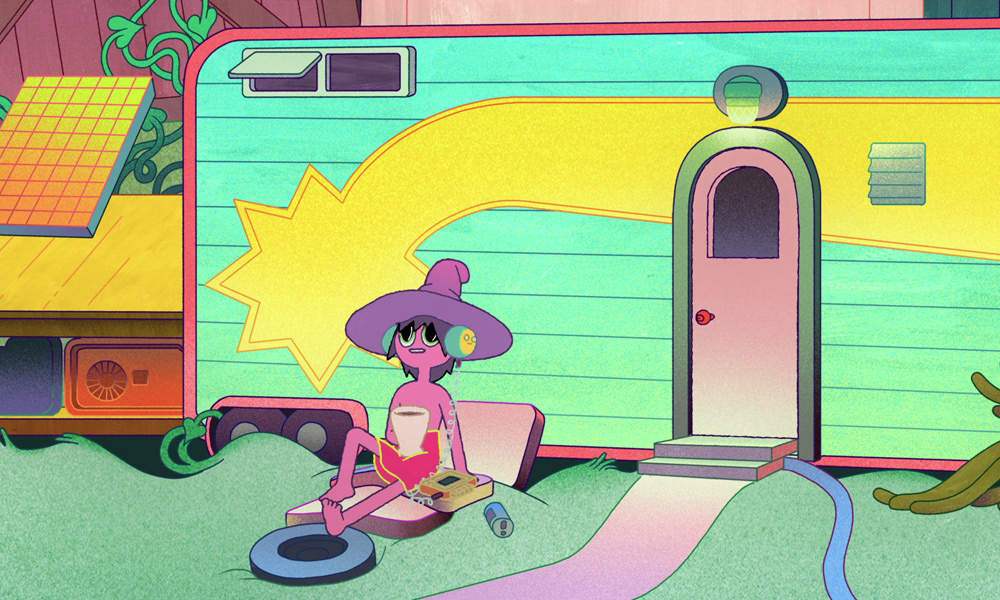Season Review: The Midnight Gospel Season One
(SPOILERS AHEAD)
Boy, this year’s 4/20 sure didn’t work out like a lot of people thought, I’m guessing. Heck, we got a whole month of 4/20 and we’re all spending it inside, likely running down supplies to properly celebrate the day. But in lieu of having grass to smoke, perhaps you might partake in the high of mental enlightenment with Pen Ward’s new animated series, “The Midnight Gospel”.
Most know the name Pen Ward for his groundbreaking series “Adventure Time”, which heralded for the more thoughtful and complex era of western animation we’ve enjoyed for the past decade. While he parted ways with the production of that show around halfway through its original run, this treasured bearded weirdo has returned to animation once again to turn up the existential insightful-ness up to eleven million with “The Midnight Gospel”, a co-creation with Duncan Trussell, a former collaborator on Adventure Time. The sparks for this show had actually been in the works for awhile, with Ward initially contacting Trussell in 2013 during the first years of Trussell’s podcast, “The Duncan Trussell Family Hour” in order to adapt the podcast into an animated series. Ward found Trussell’s podcast very insightful, even a meditation, and looked to turn it into both a visual and conversational exploration about life, the universe, and everything.
And so, we have Clancy, a “space caster” with an illegal machine which allows him to simulate visiting alternate realities of increasing surrealism so he can interview those living there about drugs, death, love, life, connection, and other metaphysical concepts, then send their conversations out into his own universe for his listeners. Each time, Clancy takes on odd forms to fit in with his guests, often finding himself going on intense spiritual journeys in the process of simply following his chosen companions around their daily lives. But in reality, this audio from Duncan Trussell’s podcast where he and his guests have intense discussions which have comedic and metaphorical animated journeys that help make the deconstruction of these concepts more visually accessible to those who want to see those discussions and what the guests are saying through their own eyes. This becomes more apparent and necessary as the topics become more abstract and personal for Clancy/Duncan, especially when we reach the finale.
There are plenty of upsides to handling a series like this in such a unique way, those mostly being that it makes the series a very novel experience to absorb, as the conversations presented touch on very universal experiences that virtually every potential viewer will be able to find a connection to in some way, helped by very charming animation that acts as the sugar helping the surreal medicine go down. But an accidental downside to this is that these episodes can drift so far into the conversational that one cannot be blamed for tuning out after a certain point. The Midnight Gospel is not really a series made for the typical story structure of an animated series, which allows it to be more free flowing, but it’s this flowing that can also allow a lack of attention to events taking place. A storyline does develop over the course of the season, but it’s very fluid and is more than likely not really the point of the series in the first place. So while it can be difficult to fully immerse your mind into the goings on within each episode or the series overall, it might be worth it to let your heart guide you through the odd truths on display that become more apparent as the series goes on.
All of this weirdness feels like a natural escalation of the trippier aspects of modern Cartoon Network shows AND the trippier Adult Swim programs, but it all culminates in the final episode (of this season at least), which uses audio of an old interview Trussell did with his mother when she was terminally ill. This brings together a lot of the topics showcased in previous episodes, including the episode prior to that where Clancy interviews a comedic interpretation of the concept of death. The series itself doesn’t pull its punches with this either, even noting in the episode description that the interview is with his late mother. Knowing that from the start, their interactions throughout the episode are tinged with both love and sadness, but every word regarding the topic of living life when one knows they are dying becomes that much more powerful, accompanied with animation of Clancy starting as a baby, growing old with his mother, watching her die, giving birth to HER, watching her grow up with him, then the two of them turning into planets until his mother planet is sucked into an Ouroboros rimmed black hole. This series is nothing if not thoughtful with its imagery, and I expect their won’t be a dry eye in any of the quarantined houses watching this. And probably a lot of calls to moms afterwards.
While Pen Ward once said he wouldn’t return to do a new animated series, The Midnight Gospel has proved to be a real treat, especially in the dire constraints the world finds itself in. Many people have had to wrestle with questions about their lives, what their death could mean, how to express their love, and how to find long sought enlightenment. While this show might not be able to provide that entirely, it’s probably a good start in understanding it. At times like these, we might need some looking inward to understand which things in life we really need or really understand, which is exactly what this series can provide. With only about four hours of content, it’s an easy binge and perfect to go with whatever experience enhancing substances you might choose. You’ll be staying inside for a long time, contemplating the nature of the universe itself until you find yourself needing to upload your thoughts to the airwaves for every universe to hear. That’s how much The Midnight Gospel will stick with you. See you on the other side.

























"There are also other characters that come and go (also owned by the Warner Bros. Discovery conglomerate media company)."
Huh. Is that just referring to other characters from the show itself, or is this implying that the new season is going to have cameos from other WBD IPs